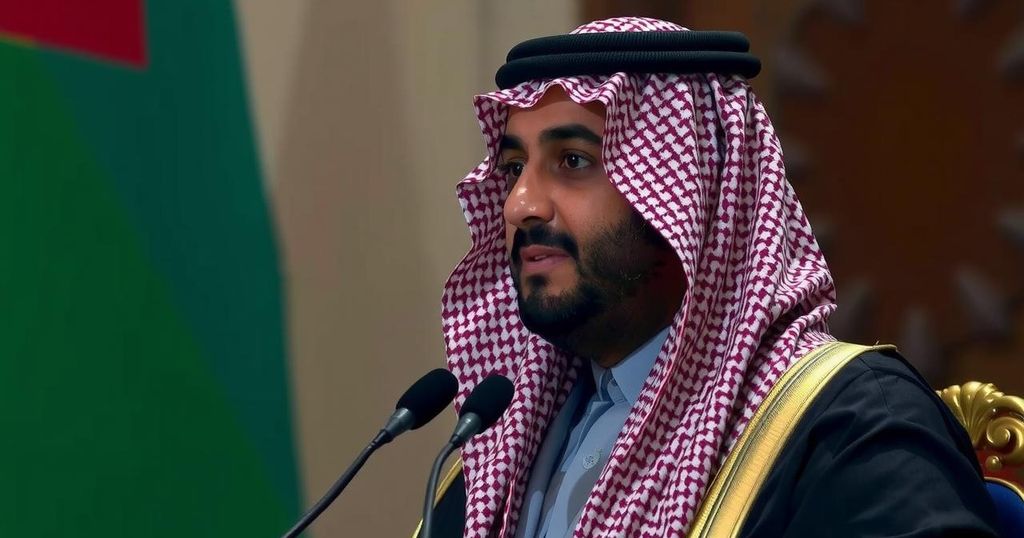Saudi Crown Prince Mohammed bin Salman condemned Israel’s actions in Gaza as “genocide,” marking a notable critique from a Saudi official. The statement emerged during a summit where leaders demanded complete Israeli withdrawal from the West Bank and Gaza. Saudi Foreign Minister criticized global inaction regarding the crisis. The situation follows a deadly assault by Hamas, leading to substantial casualties, and highlights increasing geopolitical tensions involving Iran and the U.S.
In a significant denunciation of Israel’s actions in Gaza, Saudi Crown Prince Mohammed bin Salman labeled the offensive as “genocide” during a recent summit of Muslim and Arab leaders. His comments mark some of the most severe public criticism of Israel by a Saudi official since the outbreak of the conflict. The Crown Prince also condemned Israeli military actions in Lebanon and issued a warning against attacks on Iranian territory, reflecting an effort to strengthen relations between Saudi Arabia and Tehran. At the summit, leaders collectively demanded a complete Israeli withdrawal from both the West Bank and Gaza. Meanwhile, Saudi Foreign Minister Prince Faisal Bin Farhan Al-Saud criticized the international community for its failure to halt hostilities in Gaza, attributing the situation to Israeli actions leading to starvation among the population. He stated, “Where the international community primarily has failed is ending the immediate conflict and putting an end to Israel’s aggression.” The current conflict in Gaza ignited following a Hamas attack on October 7, 2023, which resulted in approximately 1,200 deaths and 251 individuals taken hostage in Israel. In response, Israel initiated a military campaign aimed at dismantling Hamas, which has reportedly resulted in over 43,400 fatalities in Gaza, according to the health ministry affiliated with Hamas. A United Nations Human Rights Office report noted that around 70% of verified casualties in Gaza were women and children over the past six months. Participants at the summit also condemned Israel’s ongoing attacks on United Nations personnel and facilities in Gaza. Recently, the Knesset approved legislation prohibiting the UN Relief and Works Agency (UNRWA) from operating in Israel and East Jerusalem, alleging that the agency collaborates with Hamas. This legislation has triggered concern among various countries, including the United States and the United Kingdom, regarding its potential to hinder aid transfer to Gaza. Amidst the backdrop of this summit, attention is drawn to Donald Trump’s possible return to the White House. Gulf leaders acknowledge his close ties to Israel, yet they maintain positive relations with him and are hopeful that his influence could facilitate conflict resolution in the region. In Saudi Arabia, perceptions of Trump are more favorable compared to President Joe Biden, despite a history of mixed outcomes during his previous administration. Some of his notable actions include recognizing Jerusalem as Israel’s capital and facilitating the Abraham Accords, which improved Israel’s relationships with several Arab nations. One editorial in a prominent Saudi newspaper highlighted the potential for stability with Trump’s anticipated resurgence: “A new era of hope. Trump’s return and the promise of stability.”
The article discusses Saudi Arabia’s strong condemnation of Israel’s military actions in Gaza, particularly through the remarks of Crown Prince Mohammed bin Salman. The situation has caused significant casualties following a Hamas attack that sparked the ongoing conflict, bringing attention to the humanitarian crisis in Gaza. This context reflects broader geopolitical dynamics, including Saudi Arabia’s relationship with Iran and the implications of potential U.S. political shifts under Donald Trump.
In conclusion, the recent statements from Saudi leaders reflect a critical stance towards Israel’s actions in Gaza, condemning the situation as genocide and demanding an end to military aggression. This underscores the urgency for international intervention amidst a growing humanitarian crisis. The ongoing trajectory of U.S. political leadership, especially regarding relations with Israel, may further influence diplomatic efforts in the region. Thus, Saudi Arabia’s engagement in advocating for a resolution highlights a pivotal moment in Middle Eastern geopolitics.
Original Source: www.bbc.co.uk







